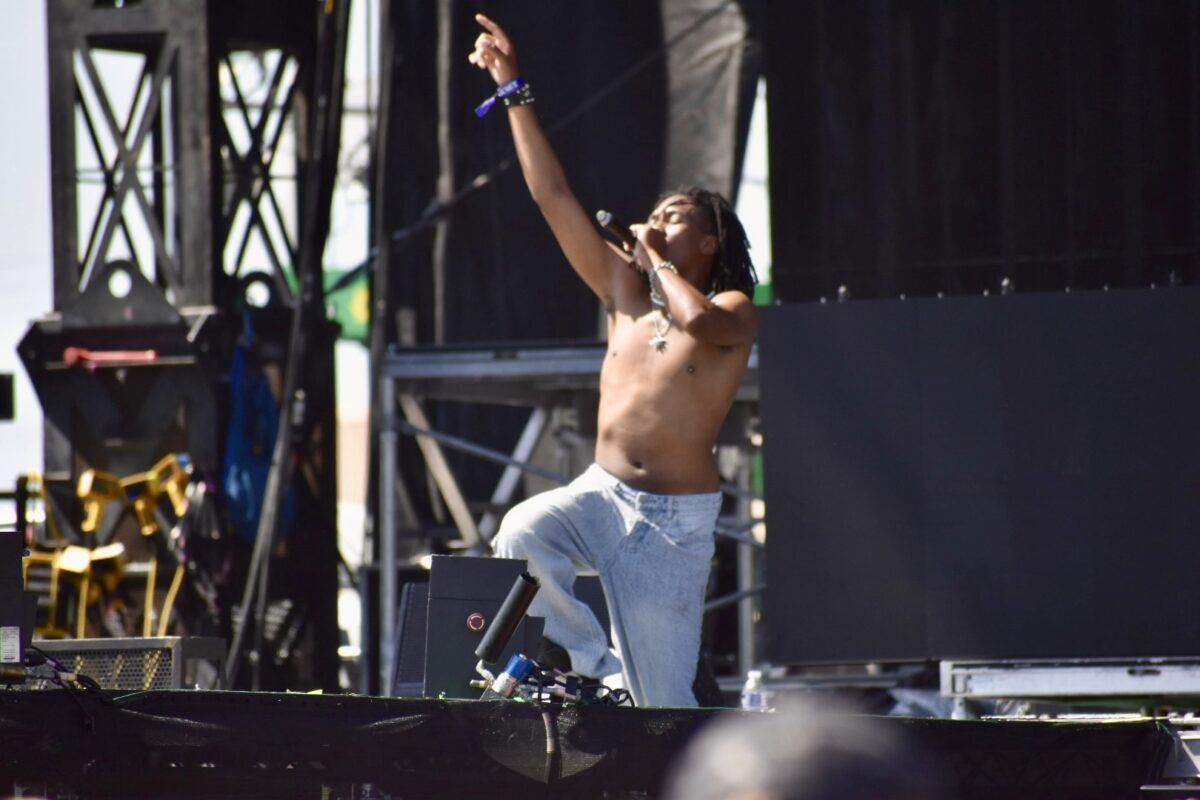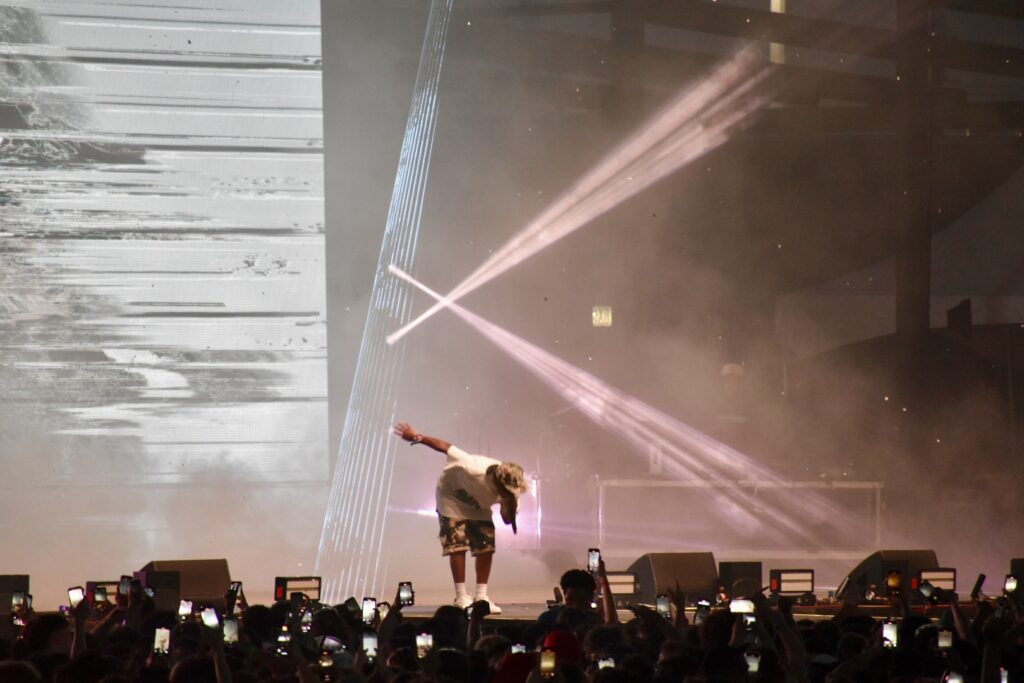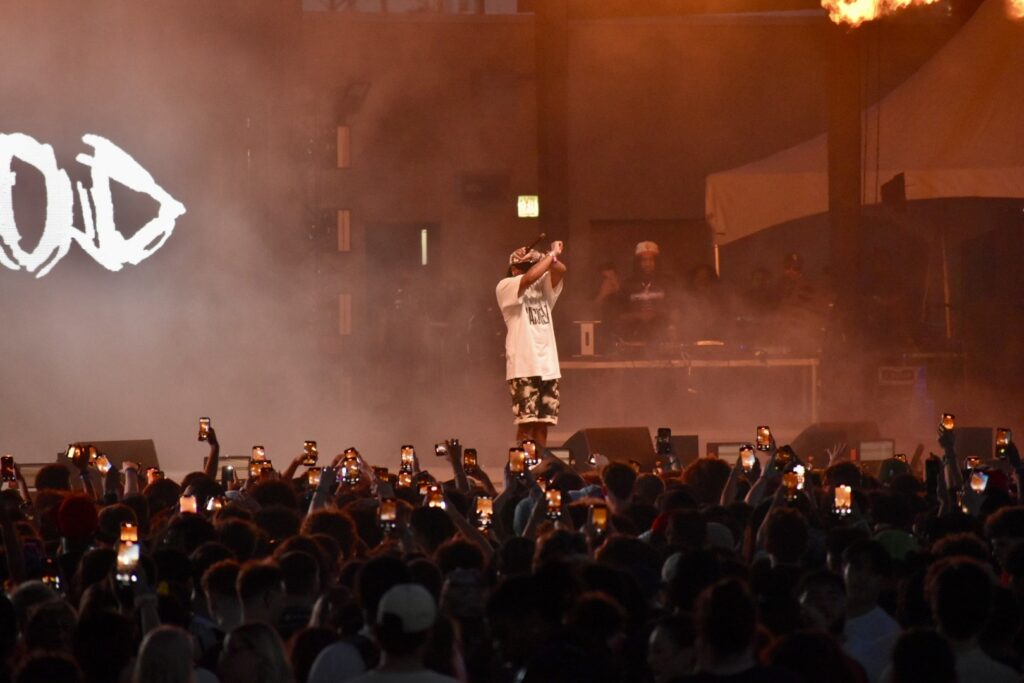The rage began in our pockets, but it would end with mascara dripping, a lost Pokémon Go watch, sweat-soaked layers, and mud-caked shoes. The morning of June 16 brought a barrage of notifications from Lyrical Lemonade’s flagship Bridgeview hip-hop festival—each alert teasing clarity, others delivering confusion. By Thursday afternoon, less than 24 hours before the festival began at 3 p.m. on Friday, Summer Smash still hadn’t released its schedule; the full lineup didn’t drop until 9:02 p.m.
Perhaps this was preparation for an event celebrating artists who scramble hip-hop’s traditional categories. The Lyrical Lemonade Summer Smash Festival 2025 wasn’t just testing Chicago’s patience; it was evaluating the city’s legendary hip-hop discernment against a new generation of genre-fluid performers, artists who refuse to be categorized. Over a few days, the festival would serve as a real-time laboratory for hip-hop’s evolution, with Chicago’s notoriously demanding audiences as the ultimate judges of authenticity.
Day 1 (June 20)
As a first-time Summer Smash attendee, everything ran remarkably on schedule, starkly contrasting the week’s digital confusion. Less impressive were the sanitation logistics: with trash cans scarce, the grounds quickly transformed into a landfill. The extremely long lines tested patience, but Lyrical Lemonade’s signature beverages and collector’s cans provided solid refreshment, with Beatbox’s on-site presence adding welcome variety.
Waka Flocka’s Unexpected Triumph
Memphis rapper NLE Choppa’s last-minute absence could have dampened Day 1, but Waka Flocka Flame’s replacement set proved the veteran still commands a crowd. His performance of “Round of Applause” generated nostalgic excitement, while his EDM-teased “Grove St. Party” showed adaptability that younger artists could learn from. Most memorably, Waka jumped directly into the crowd, a move that epitomized the day’s raw energy.
From Soundcloud to Trippie Redd
Before Trippie Redd even appeared, his signature “I love Trippie Redd” tag played through the speakers, building anticipation. When he finally took the stage, shouting “Big 14!” energy radiating from the crowd confirmed what many suspected: that Chicago wasn’t unfamiliar with hip-hop’s complexity. What followed was a crowd-pleaser setlist that showcased Trippie’s proven hits rather than his artistic range. While tracks from his underrated album Mansion Musik or the vulnerable genre:sadboy EP collaboration with MGK might have tested his genre-fluid reputation, Trippie chose the path of guaranteed euphoria, and who would argue with thousands of wild fans. He opened with the dark energy of “Dark Knight Dummo” and “The Grinch” before transitioning into “Holy Smokes,” which capitalizes on pop-inspired bitcrushed synthesizers and video game samples.
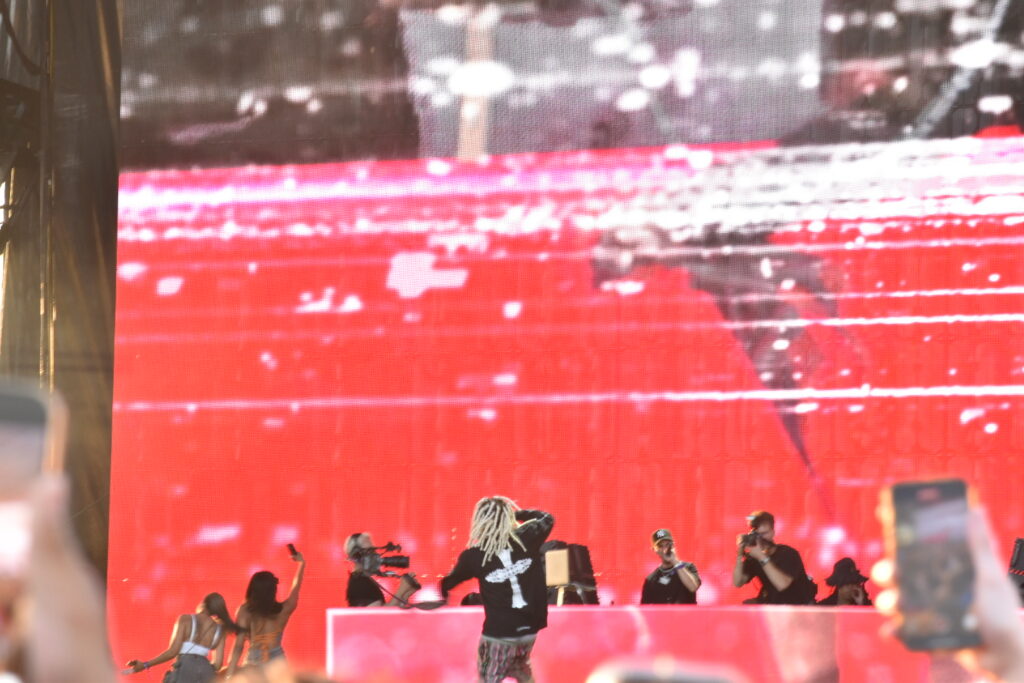
“Demon Time” ignited the audience with its aggressive energy, while “Matt Hardy 999” showcased his ability to channel raw emotion into anthemic choruses. The inclusion of “Wish”, “Topanga,” and “Taking A Walk” moved from gospel-infused melody to contemplative vulnerability, balancing emotional exploration with hip-hop’s rhythmic foundation.
Near the end of his set, Trippie returned to his opening energy, shouting “Big 14!”, this time counting “1… 2… 3…” with the crowd before closing with “F*ck Love”—a song that would have been dismissed as too soft or experimental. Instead, the audience sang along to every word, suggesting a fundamental shift in what Chicago considers authentic hip-hop expression. Here was proof that Summer Smash’s programming wasn’t accidental; the festival had correctly identified an audience ready for hip-hop’s natural evolution.
Behind the Ski Mask of a Slump God
“I also go by Beyonce as well,” Ski Mask the Slump God jokingly announced before performing “Nuketown” from his 2018 Stokeley album. Ski Mask the Slump God’s performance felt like hip-hop staring directly into its future. His flow channeled Ole Dirty Bastard’s unpredictable energy, but filtered through a distinctly modern lens.
One of the few “SoundCloud” artists to find critical acclaim, the crowd’s reaction to “Catch Me Outside” and “Take a Step Back” demonstrated Chicago’s appreciation for technical skill and raw energy. But, Ski Mask’s most powerful moment came when he transitioned into “Legends,” a poignant tribute to the late Juice WRLD that showcased his ability to balance reverence with lyricism.
And rather than simply covering “Look At Me!”—XXXTENTACION’s breakthrough track—he used it as a celebration of his late friend’s influence while demonstrating how that legacy continues to catapult his career’s experimental momentum.
Throughout his set, Ski Mask proved that tribute and innovation aren’t mutually exclusive. His performance honored hip-hop’s recent past while pushing its boundaries forward, evidence of a generation that views genre boundaries as suggestions rather than rules. His seamless flow between high-energy tracks and emotional tributes showed an artist comfortable with hip-hop’s expanding emotional vocabulary, exactly the kind of versatility that Summer Smash was designed to showcase.
Day 2 (June 21)
Adios Post Malone, 1900Rugrat’s in Town
Among Day two acts, 1900Rugrat commanded our attention with the presence of an artist on the precipice of something bigger. The crowd moved with every gesture, defying the stiff humidity as he delivered “One Take Freestyle”—the track that launched him into viral recognition in 2024—and “Cheat Codes” with his distinctly recognizable voice cutting through the sweltering stadium.
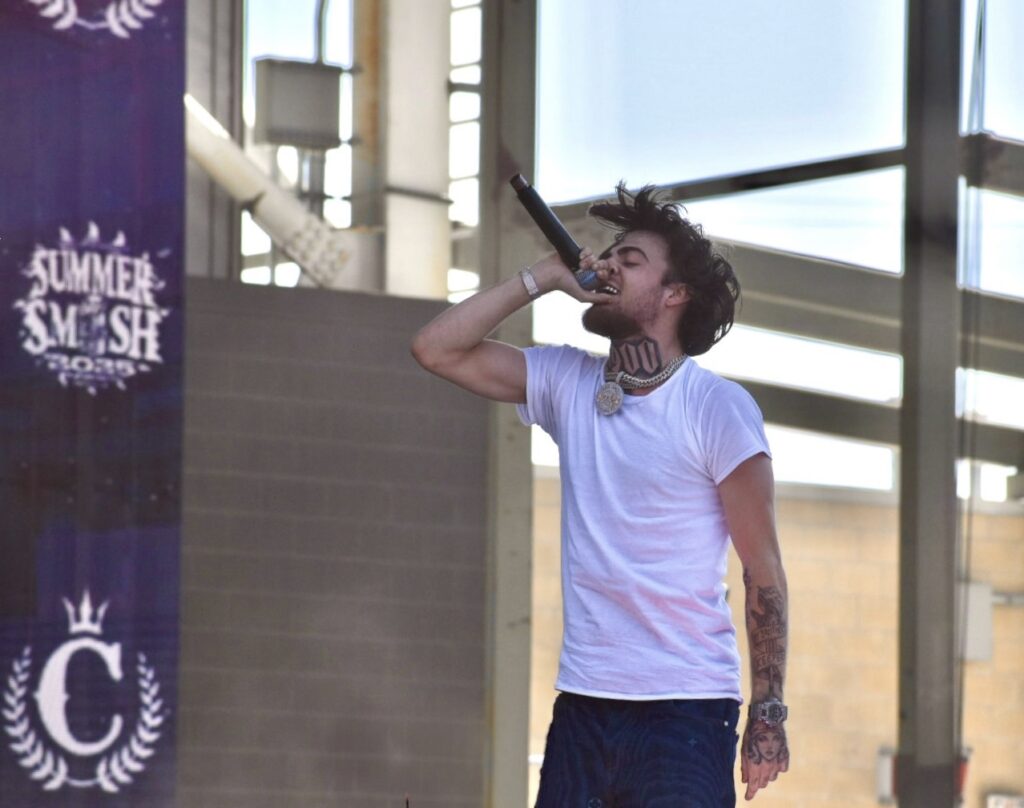
1900Rugrat represents the festival’s commitment to showcasing hip-hop’s next generation. Following the familiar trajectory of SoundCloud-era pioneers like Ski Mask and XXXTentacion, he built his foundation through social media uploads before transitioning to his debut studio album Porch 2 The Pent, released just four months prior in February 2025. His Summer Smash performance showcased the raw charisma that has quickly distinguished him in hip-hop’s stifled landscape, suggesting that the festival’s curatorial eye extends beyond established names to identify emerging talent worth watching.
Jasiah Deserves More Credit.
Saturday’s hottest moment—apart from the heat index—came from an unexpected source. Jasiah’s appearance felt like discovering the festival’s best-kept secret—an artist whose 2025 release, No Holds Barred represents everything Summer Smash claims to champion. His performance embodied the raw energy that connects contemporary alternative hip-hop to its punk and metal influences, creating a sonic bridge that Chicago’s modern musical renaissance could appreciate.
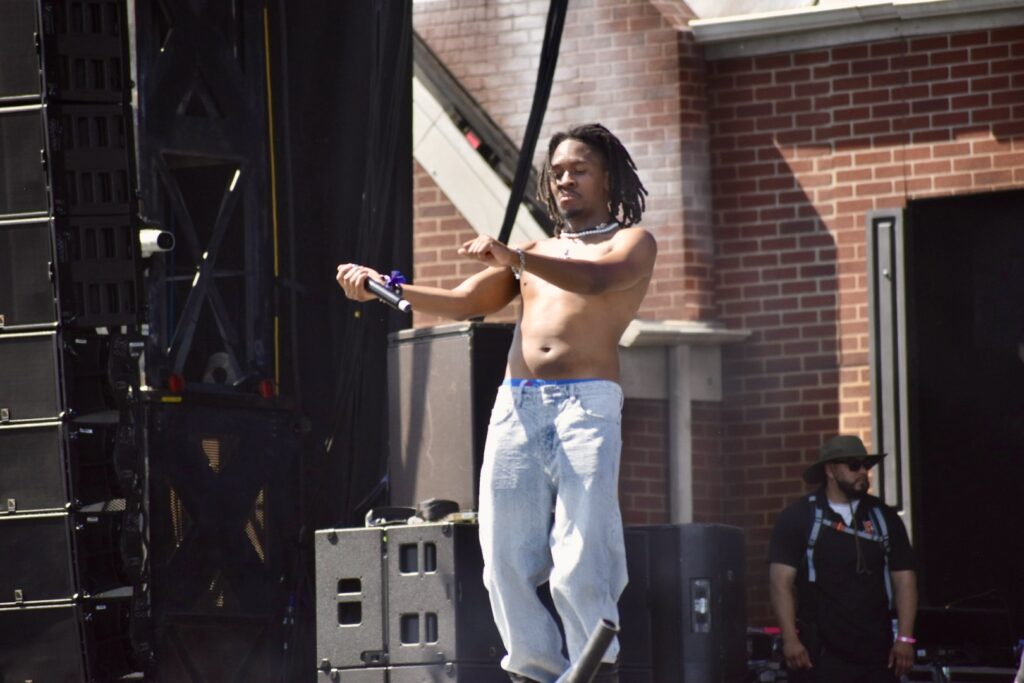
The crowd’s response to Jasiah revealed something crucial about Summer Smash’s audience: they’re not just tolerating musical experimentation, they’re actively seeking it. His set became a litmus test for how far Chicago’s hip-hop scene has evolved from its drill and house roots, and the enthusiastic reception suggested the city is ready for hip-hop’s next phase.
Throughout both days, Chicago’s crowd behavior told its own story. The same audiences that championed drill’s aggressive authenticity embraced Trippie Redd’s familiarity. Fans who grew up with house music’s four-on-the-floor rhythms adapted to Ski Mask’s irregular flows. This isn’t cultural abandonment, it’s maturity, with Chicago’s hip-hop community proving its adaptability while reassessing the bar.
The festival’s most cohesive element was the influence of XXXTentacion threading through nearly every performance. From Trippie Redd’s genre-defying approach to Ski Mask’s emotional vulnerability, from Jasiah’s alternative aggression to the other acts’ experimental freedom, X’s impact on hip-hop’s willingness to embrace contradiction was everywhere.
The artists Summer Smash showcased don’t just rap about struggle—they explore depression, anxiety, intimacy, and loss with the same intensity that previous generations reserved for street narratives. And they do so by deliberately questioning hip-hop’s standards and rejecting labels.
The weekend revealed that Chicago’s hip-hop scene has evolved from gatekeeper to greenhouse, nurturing hip-hop’s experimental future. Summer Smash 2025 didn’t just document this evolution—it accelerated it.
NaBeela Washington is an Alabama-raised journalist, poet, and budding art collector whose work explores what’s possible. Learn more at nabeelawashington.com.

